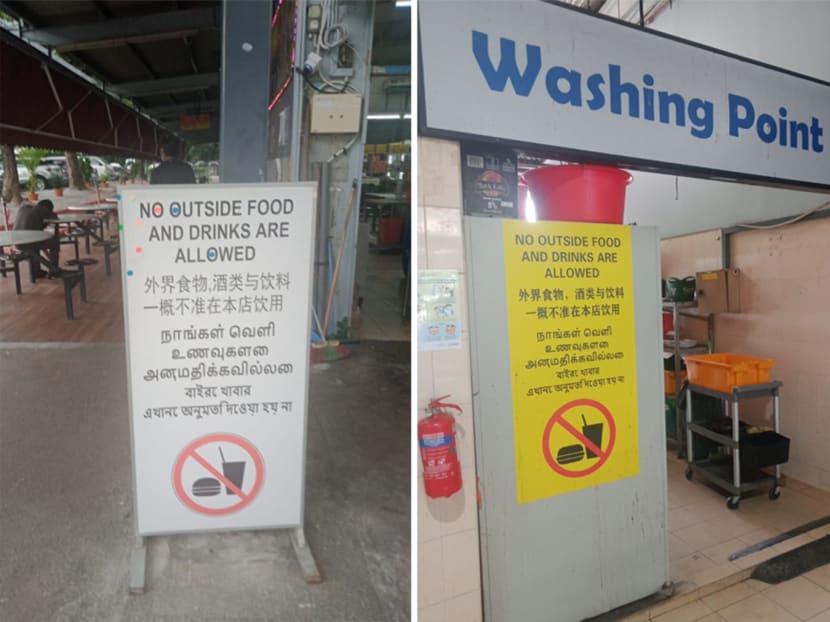Migrant Workers' Centre apologises for errors in Tamil and Bengali signs at recreation club
SINGAPORE — The Migrant Workers' Centre (MWC) has apologised for errors in signages placed around its recreation club on Soon Lee Road meant for foreign workers, following feedback from a Bangladeshi worker who photographed several wrong spellings in his native language.

Signs at the Migrant Workers’ Centre recreation club that have errors in Bengali and Tamil.
- The Migrant Workers' Centre has apologised for errors in signages placed around its recreation club on Soon Lee Road
- The signs contained several incorrect and misplaced characters in Tamil and Bengali
- Some migrant workers said the problem of erroneous text in their native language is a common occurrence in Singapore
SINGAPORE — The Migrant Workers' Centre (MWC) has apologised for errors in signages placed around its recreation club on Soon Lee Road meant for foreign workers, following feedback from a Bangladeshi worker who photographed several wrong spellings in his native language.
The signs in English, Chinese, Tamil and Bengali were to inform workers that "outside" food and drinks bought from other places were not allowed at the food court.
They contained several incorrect and misplaced characters in Tamil and Bengali. In Tamil, the translations of “food” (third word) and “not allowed” (fourth word) were wrong.
MWC said in response to TODAY's queries that it is correcting the errors.
The errors in Bengali were spotted by MD Sharif Uddin, a construction supervisor from Bangladesh who documented four signs placed at the canteen, coffee shop, food areas and toilet.
Writing in a Facebook post on April 7, the poet and writer said: “I have a humble request to the authorities of the recreation centre to write the Bengali language correctly.”
In response to TODAY’s query, MWC's executive director Bernard Menon said: “While the signage was factually correct, it was not well-translated and we apologise for any inconvenience or discomfort it may have caused to our Tamil- and Bengali-speaking migrant workers.
"We will be updating the signages as soon as possible.”
He added that MWC works with its vendors and staff members who are familiar with the languages to ensure translations are accurate before putting up signages.
The errors by the non-government organisation follow other wrong Tamil signs that have come to public attention.
In 2014, the third word in food centre Lau Pa Sat was mistranslated as Sani, meaning Saturday in Tamil.
The word could also be used to curse people in the language.
In 2017, National Day Parade (NDP) brochures distributed to Primary 5 students at the parade preview had numerous missing and misplaced letters, making the words unintelligible.
Then in 2020, the NDP live show had text errors in the Tamil line “My Singapore”, which was displayed on LED screens during a performance.
In interviews with TODAY, several Bangladeshi migrant workers said that the problem of erroneous text in their native language is a common occurrence in Singapore.
They cited examples of misspelt workplace safety sign boards, medical prescriptions and Singapore phone cards sold to migrant workers.
Bengali speakers interviewed by TODAY emphasised the importance of their language to their ethnic and national identity.
When approached, Mr Mohsin Malhar, chief editor of Bengali newspaper Bangla Kantha in Singapore, referred TODAY to a statement he made in an infographic he posted on Facebook on Feb 20.
In the infographic, he said: “Banglar Kantha feels strongly that the purity of the Bengali languages should be preserved, that the written language should demonstrate correct spelling, grammar and vocabulary.
"Especially for the migrant population far from home, holding the mother language to a high standard is of extreme importance in preserving our national identity, our customs and literary traditions, and our attachment to family and ancestors.”
The post was intended to celebrate International Mother Language Day on Feb 21.
In Bangladesh, it is observed as Language Movement Day, a national holiday.
The Bengali Language Movement has been linked to the assertion of a Bengali national identity and the Bangladesh Liberation War that saw Bangladesh become an independent country.
Speaking to TODAY, Mr Sharif said: “Our people fought for our mother language. We love our language, just as the people of every country."
Tamil speakers also weighed in on the issue of mistranslated Tamil words.
Mr Vijayaraj Muthukumaran, president of National University of Singapore's Tamil Language Society, noted that in recent years, it has been "very rare" to see public signs such as those at MRT stations, schools, government-issued brochures or advisories containing translation errors or use of wrong language.
"There are occasional minor typos in some longer messages, but that is somewhat comparable to those in English language,” he added.
“I believe this has to do with having the translation carried out by individuals sufficiently proficient in Tamil language and having vetting procedures. For private signs, however, the challenges can be a little different.”
Mr Danapal Kumar, president of Singapore Tamil Teachers' Union,
said that the most common problem is gibberish, which is caused by technical issues with font conversion as a result of incompatible computer software.
"Even after thoroughly checking and ensuring accuracy, at the point of printing, gibberish fonts may surface, especially for private vendors and entities that may not have sufficient resources to do quality check," he explained.









